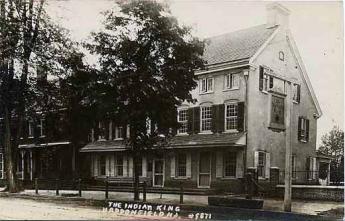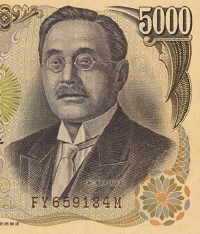Related Topics
Japan and Philadelphia
Philadelphia and Japan have had a special friendship for 150 years.
Haddonfield (all 26)(1 of1)volume 38
 Haddonfield is a bit of a secret. It's Philadelphia's "Main Line, East"
Haddonfield is a bit of a secret. It's Philadelphia's "Main Line, East"
Quakers: All Alike, All Different
Quaker doctrines emerge from the stories they tell about each other.
Favorite Reflections
 In no particular order, here are the author's own favorites.
In no particular order, here are the author's own favorites.
Favorites - II
More favorites. Under construction.
Quaker Peace Testimony
New topic 2016-12-04 04:05:49 description
Interesting Quaker Characters
All alike, but all different.
Inazo Nitobe, Quaker Samurai

|
| Inazo Nitobe |
The story of Inazo Nitobe (1862-1933) comes in two forms, one from the Philadelphia Quaker community, and the other from his home, in Japan. One day in Philadelphia, a well-known ninety-year-old Quaker gentleman, rumpled black suit, very soft voice -- and all -- happened to remark that his Aunt had married a Samurai. A real one? Topknot, kimono, long curved sword, and all? Yup. Uh-huh.
That would have been Inazo Nitobe, who met and married Moriko, nee Elizabeth Elkinton, while in college in Philadelphia. He became a Quaker, and when the couple returned to Japan, the Emperor then found himself confronted with a warrior nobleman who was a pacifist. You can next perceive the hand of his Quaker wife in the deferential diplomatic suggestion that there were vacancies for Japan at the League of Nations and the Peace Palace in the Hague. Perhaps, well perhaps, there could be service to his Emperor as well as his new religion in such an appointment for her new husband. Good thinking, let it be done. As far as Philadelphia is concerned, Ambassador Nitobe next appeared when Japan was invading Manchuria. The Emperor had sent Nitobe on a tour of America to explain things. At the meetinghouse then on Twelfth Street, Nitobe adopted the line that Japan was only bringing peace and order to a chaotic barbarian situation, actually saving many lives and restoring quiet. After a minute of silence, Rufus Jones rose from his seat on the "facing bench": He was having none of it. And that was that for Nitobe in Philadelphia.
The other side of this story quickly appears if you go to Japan and ask some acquaintances if they happen to have heard the name Inazo Nitobe. That turns out to be equivalent to asking some random American if he has ever heard of Abraham Lincoln. To begin with, Nitobe's picture appears on the 5000 Yen ($50) bills in everybody's pocket. He was the founder of the University of Tokyo, admission to which now is an automatic ticket to Japanese success. He wrote a number of books that are now required reading for any educated Japanese. A number of museums, hospitals, and gardens are named after him; one of them outside Vancouver, at the University of British Columbia.
Nitobe's father, Jujiro Nitobe, had been the best friend of the last Shogun, deposed by the return of the Emperor to effective control after Perry opened up Japan to Western ideas. The Shogun was beheaded, of course, and the tradition was that the victim could ask his best friend to do the job because he would do it swiftly. Jujiro was unable to bring himself to the task, refused, and his family was accordingly reduced to poverty. Subsequently, the Samurai were disbanded by the newly empowered Emperor, given a pension, and told to look for peaceful work. Inazo Nitobe was in law school when the Emperor's emissary came and said that Japan did not need culture, it had plenty of culture. The law students would please go to engineering school, where they could help Japan westernize.
Nitobe later wrote a perfectly charming memoir, called Reminiscences of Childhood in the Early days of Modern Japan , which dramatizes in just a few pages just how wide the cultural gap was. For example, Nitobe's father brought home a spoon one day, and this curious memento of how Westerners eat was placed in a position of high honor. One day, a neighbor ordered a suit of western clothes, and hobbled around it, saying he did not understand how Westerners are able to walk in such clothes. He had the pants on backward.
One of Nitobe's greatest achievements was to struggle with his appointment as Governor of Formosa (Taiwan). Japan acquired this primitive island in 1895, and Nitobe got the uncomfortable role of colonist in Japan's first experience with colonization. He sincerely believed it was possible for Japan to bring the benefits of Westernization to another Asian backwater, but just as the British found in their colonies, there was precious little gratitude for it. Although he was undoubtedly acting dutifully on the Emperor's orders when he later came to Twelfth Street Meeting, he surely knew -- perhaps even better than Rufus Jones -- that there was something to be said on both sides, no matter how conflicted you had to be if you were in a position of responsibility. This most revered man in his whole nation almost surely saw he had been a complete failure in Philadelphia.
Originally published: Friday, June 23, 2006; most-recently modified: Wednesday, May 22, 2019